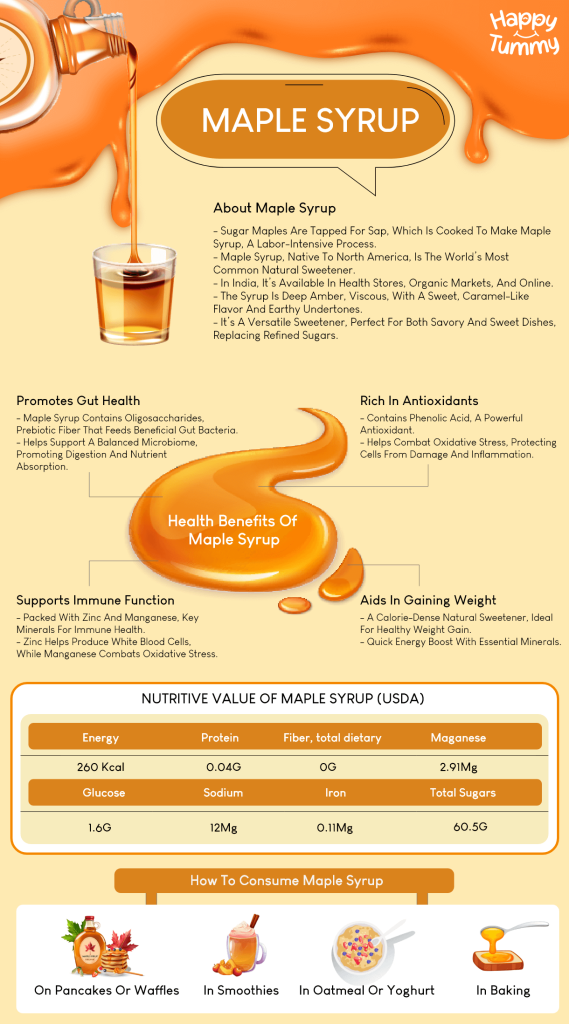Table of Contents
Have you ever wondered how something as good as maple syrup can be healthy for you?
Suppose that drizzle on your pancakes was more than a perk to your taste?
As gut health continues to become the foundation of overall health, maple syrup has found itself in the limelight as more than a natural sweetener.
Filled with antioxidants, minerals, and compounds capable of developing a healthy digestive system, this gold drink could be a key to a better-developed gut and a happier you.
In this blog, we are going to find out about how maple syrup may help in digestion, in strengthening the immune system, and in promoting your health both inward and outward.
About Maple Syrup
Sugar maples are tapped to harvest sap, which is to cooked to create maple syrup. This is a time-consuming and labor-intensive procedure to turn the sap into an aromatic syrup.
Maple syrup, the most common natural sweetener in the world, was initially found in North America, especially in Canada and the northeastern region of the United States.
In India, maple syrup is not as common; however, it is available in some health stores, some organic markets, and online.
It is deep amber in colour and very slick and viscous. It has a robust taste of sweetness complemented with caramel and a touch of woody, earthly flavor.
As a natural sweetener, maple syrup is also known to be versatile and can be utilised in savoury and sweet dishes in place of refined sugars.
Aashirvaad Atta with Multigrains, and its highly qualified nutritionists created the My Meal Plan test. This test determines how much fibre you consume each day and generates a sufficient food plan that meets your needs.

Nutrition Value OF Maple Syrup (USDA) [1]
| Nutrient | Values |
| Energy | 260 kcal |
| Protein | 0.04g |
| Total lipid (fat) | 0.06g |
| Fiber, total dietary | 0g |
| Total Sugars | 60.5g |
| Sucrose | 58.3 g |
| Glucose | 1.6g |
| Calcium, Ca | 102 mg |
| Iron, Fe | 0.11mg |
| Potassium, K | 212 mg |
| Sodium, Na | 12mg |
| Zinc, Zn | 1.47 mg |
| Manganese, Mn | 2.91 mg |
Health Benefits of Maple Syrup
Maple syrup is a rich source of essential nutrients that can be attributed to many different health benefits, including strong immunity and healthy digestion.
Various health benefits of using maple syrup will be discussed in this section.
#1 Promotes Gut Health
Did you ever open the bottle of maple syrup and wonder whether it can do anything besides make your pancakes taste better?
Although not a miracle cure, maple syrup can help with gut health in less noticeable ways.
Maple syrup is rich in oligosaccharides, a form of prebiotic fibre and food for helpful gut bacteria.[2]
These prebiotics provide nourishment to your good bacteria in your gut, which may promote a healthy and balanced microbiome.
A healthy microbiome is necessary to facilitate healthy digestion, nutrient absorption, and maintain a healthy gut.
Besides prebiotics, maple syrup also contains a high amount of polyphenols, which are natural compounds that have anti-oxidant and anti-inflammatory effects.[3]
Such polyphenols may support the digestive system, besides maintaining the health of the gut and ensuring the overall good and happy tummy.
Aashirvaad Atta with Multigrains, along with a panel of experienced dieticians, developed the Digestion Quotient that gives out your digestion score out of 1 to 100. To discover your Digestive Quotient, run through this short 2-minute quiz.
#2 Rich in Antioxidants
Incidentally, maple syrup is not only sweet but also contains antioxidants. These potent compounds may provide your body with defenses against oxidative damage caused by destructive free radicals.
Phenolic acid present in maple syrup exhibits high activity as an antioxidant.[4] These antioxidants may protect against the build-up of free radicals, which may damage cells and cause chronic illnesses, ageing, and inflammation.
Antioxidants in maple syrup may manage oxidative stress in your body, support your body’s defense mechanisms, maintain your cells at a healthy state, and enhance your well-being.
Further, pure maple syrup has naturally occurring compounds such as abscisic acid and polyphenols that are shown to have anti-inflammatory properties. [5]
The maple syrup ingredients may manage inflammation by disrupting the mechanisms that initiate the effects of inflammation within the body.
#3 Supports Immune Function
Does that mean that something as sweet as maple syrup may help strengthen your immune system? Surprisingly, it might!
More to the point, the maple syrup includes minerals like zinc and manganese in smaller quantities, both of which are vital to the immune system.[6]
The produced white blood cells are involved in the production process and play key roles in body protection against infection, mainly because of zinc. It may also help control the responses of the immune system.
Manganese, on the other hand, may manage oxidative stress in the tissues as well as contribute to the optimal functioning of the immune system.
All these nutrients in maple syrup can help build a better immune system, so it is one of the best-tasting natural remedies to help your body stay healthy.
#4 Aids in Gaining Weight
Maple syrup isn’t only a delicious complement to pancakes, it’s also a natural calorie source that may aid weight gain.
Loaded with sugars, it provides a quick hit of energy and is high in minerals, giving a nutritious boost at the same time.
It is a quick and easy way to up the daily calorie consumption without increasing the size of the meals.
Snacking on a spoonful of maple syrup or adding it to your cup of smoothie or dessert is an interesting way to gain weight healthily.
Just remember, moderation is key!
How to Consume Maple Syrup
Maple syrup is a multi-purpose natural sweetener that can be used in several different ways in your diet. These are some suggestions as to how to enjoy it:
- On Pancakes or Waffles: The most common method using maple syrup is to drip it over pancakes, waffles, or toast; the sweet, rich flavor captivates.
- In Smoothies: Maple syrup gives a natural sweetness to your smoothies, and is a perfect complement to fruit, particularly bananas or berries.
- In Baking: You can replace sugar or honey with maple syrup in baking cakes, cookies, or muffins. It gives the slightest crunchiness and juiciness to your sweets.
- In Oatmeal or Yoghurt: Add a tablespoon of maple syrup to your morning oatmeal or yogurt to make your morning meal sweet and warm.
- As a Salad Dressing: Get a blend of maple syrup, balsamic vinegar, olive oil, and mustard as a yummy and easy salad dressing.
- In Coffee or Tea: For a more natural and full flavour, you can replace refined sugar with maple syrup to make your coffee or tea less sweet.
- Glazes and Sauces: Maple syrup is also suitable as a glaze used in savory preparations, like roasted vegetable glazes, roasted meat glazes, or as a topping to baked sweet potatoes.
It is essential to keep in mind, though, that despite some health benefits, maple syrup is also a sugar, and therefore, it is better to take it sparingly.
Long Story Short
The perfect taste and natural sweetness of maple syrup are not all that it can bring to your table. It is full of necessary vitamins and minerals, such as antioxidants, prebiotics, and minerals, and may help maintain gut health, improve immunity, and even manage inflammation.
Though it should be borne in mind that, despite the potential health benefits, maple syrup is also a kind of sugar.
The only way to use it effectively without overindulging in sugar consumption is to include it in a well-balanced diet.
An optimal diet is composed of whole foods, fibre, healthy fats, and protein, which are the key components of a balanced diet.
Maple syrup would be a nice addition to this diet, though it needs to be supplemented with other high-nutrient foods.
Because, as usual, we all have health factors that we need to worry about, or that we may be treating a particular ailment, there is logic in speaking with a medical professional first before making drastic changes to your diet.
It is also essential to understand that maple syrup may cause specific allergies and discomfort.
Diabetic patients, individuals with a calorie-restricted diet, and patients with liver or kidney ailments are advised to avoid maple syrup or consult a doctor before consumption.
Frequently Asked Questions
Refined sugar does not have any nutrients compared to maple syrup, which contains antioxidants, minerals such as zinc and manganese, and prebiotics.
But it is still sugar, and it should be taken as a supplement in a balanced diet.
Although maple syrup has particular health benefits, like being an antioxidant, it contains calories and sugar.
It is not a weight-loss food, but it can be a replacement for refined sugars in casual use. However, it can be taken into account if someone is looking for a high-calorie diet.
No precise dosage is recommended for maple syrup, given by the NIN/ICMR, but it has to be consumed in moderation.
One or two teaspoons a day may be a nice way to enjoy the taste and health benefits of this without overdoing it with sugar. It is recommended to avoid it if individuals have diabetes mellitus or any other health-related issues.
Maple syrup is to be kept cool and dark. Once it is opened, it is advisable to keep it in the refrigerator so that it does not get moldy.
















